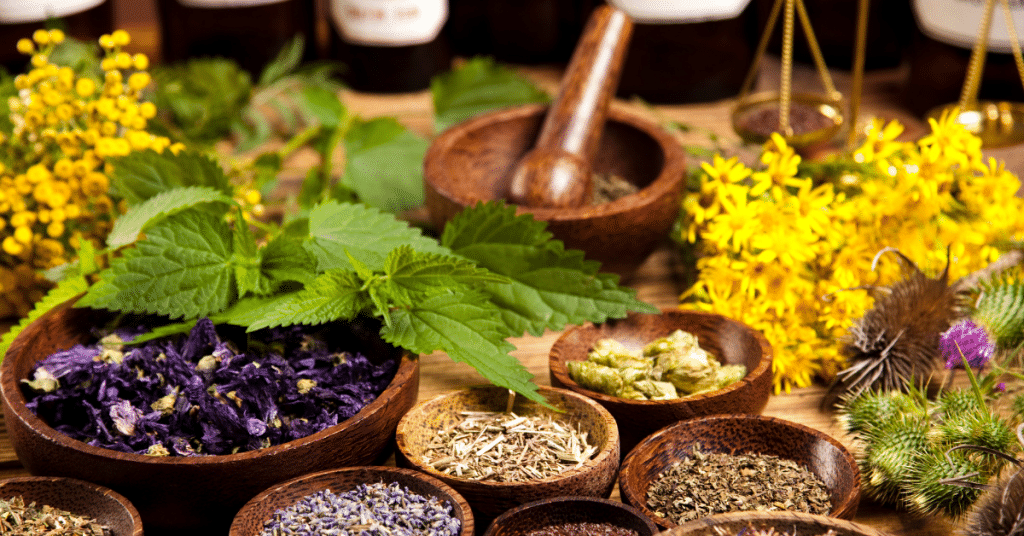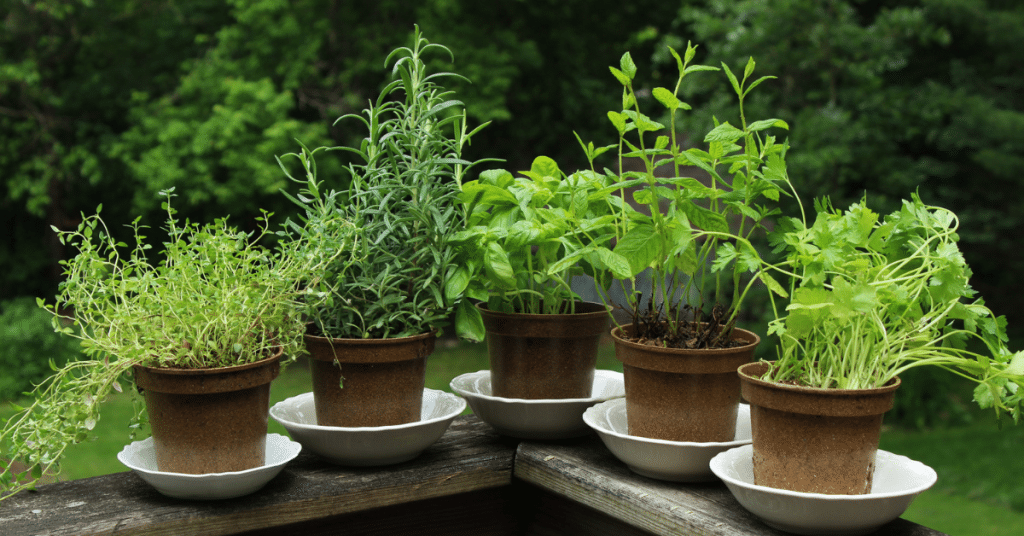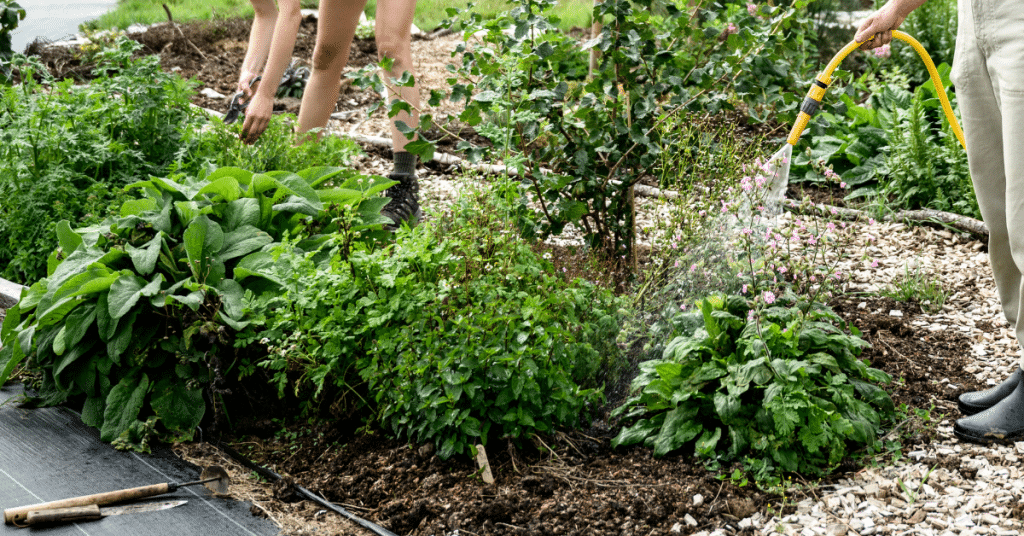
Hey there, green thumbs and wellness enthusiasts! Are you ready to embark on a journey that combines the joys of gardening with the healing power of organic herbs? Imagine stepping outside your door and plucking a sprig of fresh mint to soothe an upset stomach or gathering chamomile blossoms to brew a calming tea.
You can cultivate your own wellness sanctuary in your backyard with herbal gardening. In this beginner's guide, we'll unveil the secrets of organic herbs and help you take the first steps toward growing your herbal haven.
Benefits of Organic Herbs
You may wonder, “Why should I bother with organic herbs when I can easily buy them from the store?” Well, friend, organic herbs have a host of benefits that go beyond their culinary uses. Unlike commercially grown herbs, organic varieties are nurtured without synthetic pesticides or chemicals. This means you're safeguarding your health and reducing your environmental footprint.
Organic herbs contain essential oils, vitamin C and more, and antioxidants, making them a natural powerhouse of healing potential. From soothing stress and promoting relaxation to aiding digestion and supporting immune function, these little wonders from nature can enhance your well-being in numerous ways. By growing your own organic herbs, you have full control over their quality and can ensure they are at their peak potency when using them in teas, tinctures, or homemade remedies.
Cultivating Your Organic Herbs Paradise
Now that you know the incredible benefits organic herbs offer, let's dive into the exciting world of herbal gardening. Don't fret if you're a beginner; we'll walk you through the steps to get started.
Selecting Organic Herbs

First, you must choose the certified organic herbs that resonate with you and thrive in your climate. Are you drawn to the calming aroma of lavender or perhaps the invigorating scent of rosemary? Research which herbs suit your region well, considering factors like sunlight, temperature, and soil conditions. Don't worry; a wide range of herbs is available, so you'll surely find a selection that suits your preferences and growing conditions. Start with a few varieties to see which one survives your environment before you buy bulk organic herbs.
Preparing the Garden Bed
Select a spot in your yard with full sun, as most herbs thrive in sunny conditions. Clear the area of any weeds or debris, and loosen the soil using a garden fork or tiller. This will help the herbs establish their roots and allow for proper drainage.
To ensure your herbs have all the necessary nutrients, enrich the soil with organic compost or well-rotted manure. These natural amendments will provide the essential nutrients your plants crave. Give the soil a gentle mix, breaking up clumps, and level the surface with a rake. Remember, a well-prepared garden bed is like a blank canvas, ready to be adorned with vibrant green foliage.
Seeds or Seedlings
Now comes the exciting part-choosing how you want to start your herb garden. You have two options: sowing seeds directly into the soil or purchasing young herb seedlings from a nursery. If you're feeling adventurous and patient, starting from seeds allows you to witness the entire growth process from scratch. On the other hand, selecting seedlings can give you a head start, allowing you to enjoy fresh herbs in a shorter timeframe.
If you opt for seeds, follow the packet instructions for sowing depth and spacing. Gently water the soil afterward, ensuring it remains moist until the seeds sprout. Make small holes in the garden bed for seedlings, gently place the young plants, and cover their roots with soil. Water them in, providing a nurturing start to their new herbal home.
Planting Your Organic Herbs
Now comes the exciting part-planting your herbs! You have two options: starting from seeds or using young herb seedlings. Let's explore both methods.
a) Starting from Seeds: The Journey Begins
Growing herbs from seeds is a rewarding experience that allows you to witness the full life cycle of your plants. Follow the instructions on the seed packet for recommended sowing depth and spacing. Using your finger or a small trowel, create shallow furrows in the soil according to the packet's guidelines. Gently sprinkle the seeds into the furrows, keeping them adequately spaced. Cover the seeds with a thin layer of soil and gently pat it down.
Water the seeds carefully, using a fine spray or a watering can with a rose attachment, to avoid displacing them. Keep the soil moist but not waterlogged, as excessive moisture can lead to fungal diseases. Be patient-the germination period may vary depending on the herb, so continue to provide the necessary care and watch as your tiny seedlings emerge from the soil.
b) Using Seedlings: A Head Start to Herbaceous Bliss
If you're eager to see results more quickly or prefer the convenience of established plants, using seedlings is the way to go. Visit your local nursery or garden center and choose healthy-looking herb seedlings. Gently remove them from their containers, being mindful not to damage their roots.
Dig holes in your prepared garden bed, ensuring they're deep and wide enough to accommodate the seedlings' roots. Place the seedlings in the holes and fill the gaps with soil, gently firming it around the base of each plant.
Water the seedlings thoroughly, allowing the soil to settle around their roots. Provide them with proper care and watch them flourish and grow, ready to be utilized in your culinary adventures or healing remedies.
Caring for Your Organic Herbs

Like any living being, your herbs require ongoing care and attention to thrive. Here are some essential maintenance tasks to ensure your herbal haven remains vibrant:
Watering: Herbs generally prefer moist but well-drained soil. Water them deeply when the top inch of the soil feels dry. Avoid overwatering, as excessive moisture can lead to root rot or other issues. Consider using a soaker hose or drip irrigation system to deliver water directly to the soil, reducing water waste.
Mulching: Applying a layer of organic mulch around your herbs helps retain soil moisture, suppress weeds, and regulate soil temperature. Use materials like straw, wood chips, or shredded leaves as mulch, applying a layer about 2 to 3 inches thick around the base of your plants.
Fertilizing: Organic herbs generally don't require heavy feeding. However, you can supplement their growth with organic fertilizers. Opt for slow-release fertilizers or natural alternatives like compost or worm castings. Follow the package instructions or consult a local gardening expert for specific recommendations.
Pruning and Harvesting: Regular pruning helps shape your herbs, encourages bushier growth, and improves overall productivity. Pinch off the tips of your herbs to promote branching and prevent them from becoming leggy. Harvest your herbs regularly, plucking leaves or stems as needed, stimulating new growth. Remember to leave enough foliage for the plant to continue thriving.
Pest and Disease Management: Watch for common herb gardens pests like aphids, snails, or fungal diseases. Inspect your plants regularly, and if you spot any issues, employ organic pest control methods or consult a local gardening expert for guidance. Healthy plants are often more resistant to pests and diseases, so maintaining optimal growing conditions is key.
With proper care, your herb garden will flourish, providing an abundant supply of fresh, aromatic herbs that can elevate your culinary creations and contribute to your well-being.
Congratulations! You're well on your way to becoming a skilled herbal gardener. The next section explores the fascinating world of herbal remedies and how different herbs can address specific health concerns. Get ready to unlock organic herbs' healing potential and discover their wonders.
Exploring the Healing Properties of Organic Herbs
Welcome back to the final installment of our beginner's guide to herbal gardening! By now, you've learned the basics of cultivating your own herbal oasis and witnessed nature's magic as your herbs flourish. This section examines some popular herbs and their incredible healing properties. Get ready to unlock the potential of nature's medicine cabinet!
Chamomile: Serenity in a Blossom
Known for its gentle, calming properties, chamomile is a beloved herb used for centuries to promote relaxation and ease anxiety. Brewing a cup of chamomile tea can soothe frazzled nerves, improve sleep quality, and aid digestion. Harvest the delicate flowers in full bloom, dry them, and steep a tablespoon in hot water for a comforting and aromatic cup of relaxation.
Lavender: A Scented Sanctuary
With its sweet and floral aroma, lavender is renowned for its calming and stress-relieving properties. Inhaling the scent of lavender can help reduce anxiety and promote a sense of tranquility. You can create a relaxing environment by adding dried lavender flowers to sachets, pillows, or homemade potpourri. Lavender essential oil is also popular for aromatherapy and can be used in diffusers or diluted for soothing massages.
Peppermint: A Digestive Delight
With its invigorating scent and refreshing flavor, Peppermint is a versatile herb known for its digestive benefits. Brewing peppermint tea can help soothe an upset stomach, alleviate indigestion, and relieve nausea. Fresh peppermint leaves can be used to flavor beverages and desserts or added to salads for a burst of cool, minty goodness. Harvest the leaves when they are young and vibrant for maximum flavor.
Rosemary: Memory and Flavor Booster
Rosemary is not just a culinary delight; it also possesses remarkable health benefits. This fragrant herb has been associated with improved memory and cognitive function. Inhaling the aroma of rosemary essential oil or using it in cooking can help enhance focus and mental clarity. Add freshly chopped rosemary to roasted vegetables, marinades, or homemade bread for a delightful flavor.
Echinacea: Immune Support
Echinacea, also known as purple coneflower, is a powerful herb recognized for its immune-boosting properties. This herb stimulates the production of white blood cells, which are essential for fighting off infections. Echinacea is perfect as a tea, tincture, or supplement to support the immune system during cold and flu seasons. Harvest the vibrant petals of the coneflower when in full bloom to create your own herbal remedies.
Aloe Vera: Soothing Skin Savior
Aloe vera, a succulent plant with thick, gel-filled leaves, is a skin-friendly herb with many benefits. The gel inside the leaves has cooling and moisturizing properties, making it a popular remedy for soothing sunburns, minor burns, and skin irritations. Simply slice open an aloe vera leaf and apply the gel directly to the affected area for natural relief and hydration.
Remember, Consultation and Precaution
While herbs offer numerous health benefits, it's essential to exercise caution and seek professional advice when needed. Always consult a healthcare practitioner or herbalist before using herbs for medicinal purposes, especially if you have any underlying health conditions or are taking medications. Some herbs may interact with certain medications or have contraindications, so ensuring their safe usage is important.
The Garden of Wellness
Congratulations on completing your journey through the healing power of herbs! You have unlocked a world of natural remedies and wellness by cultivating your own organically grown herb garden. Whether you're sipping a cup of chamomile tea to unwind, enjoying the aromatic benefits of lavender, or adding the vibrant flavors of rosemary and peppermint to your culinary creations, herbs can enhance your well-being in delightful ways.
Remember, herbal gardening is a continuous learning process. Exploring and experimenting with different herbs deepen your understanding of their properties and how to harness their benefits. Embrace the joys of growing your certified organic herbs, and let nature's remedies nourish your body, mind, and spirit.
Now, it's time to put your knowledge into practice, continue nurturing your herbal garden, and embrace the wonders of organic herbs in your daily life. Happy gardening, and may your journey be filled with flourishing greenery and abundant wellness!
